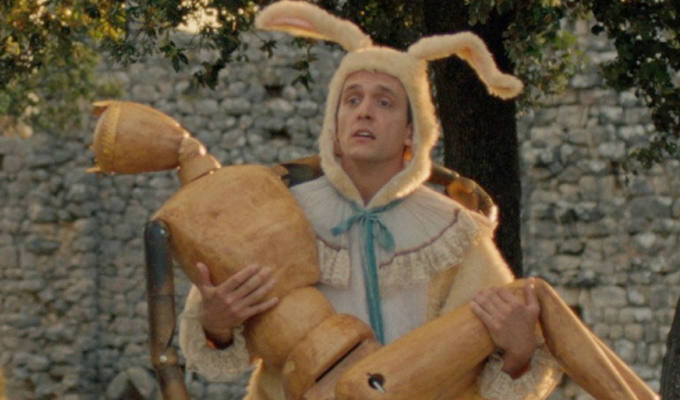
King Baby
Edinburgh Film Festival review
A darkly comic satire delivered in the form of an absurdist fairytale, King Baby sets out its stall in an amusing opening voiceover which explains how two men came to leave the modern world behind and inhabit a gloriously sunlit, mountaintop castle ruins somewhere in Europe, existing in a finely balanced, isolated symbiosis as King and Servant.
Their past lives and how they arrived at this arrangement is unimportant. The King (Graham Dickson) is vainglorious and demanding, the Servant (Neil Chinneck) willingly subservient and eager-to-please, to the extent of dressing up as a rabbit for his monarch to hunt.
However, the stability of their relationship is threatened when the King dreams of a Queen, leading him to wed a lifesize, wooden marionette. Initially, all seems well in the kingdom, the three living in harmony. But as the King's behaviour grows increasingly aggressively toxic, the Servant cannot disavow his love for his creation.
In a frenzied display of wreaked lust, paranoia and nightmare, the men's role-play is reconfigured, the story escalating into eruptions of selfishness, emasculation and violence.
Outwith some ghastly hallucinatory dream sequences and the mute projection of femininity that is the mannequin, the film is the very essence of a stripped-down, male two-hander, a self-imposed, bucolic prison for masculine desire, a gilded cage for the breakdown of patriarchal civilisation.
The feature writing-directing debut of Kit Redstone and Arran Shearing, King Baby was originally intended to be a play, penned by Redstone and Chinneck, and it very much shows.
Austentatious star Dickson is well cast as the regally buffoonish, puffed-up King, his lip curling in disdain whenever something displeases him, before he visibly deflates to the status of a hurt, lost child when he falls from grace.
Initially more sympathetic and soulfully troubled behind the eyes, Chinneck's degradation is more subtle and insidious, his cruelty more calculated, as the Servant's new world order proves as oppressive as the monarchy that preceded it.
Where the film truly scores is that its absurdist tone doesn't really change throughout, only that you modify your expectations of a silly, Monty Python-style romp as the full, brutal ramifications of the power dynamics are followed through. A mix of affected, courtly formality and blurted, playground juvenility, the dialogue is key to this.
Bleakly funny in its extremity, borrowing tropes from horror films, but with strong echoes of its origins in experimental theatre, King Baby is a delightfully droll dissection of oppression featuring two finely attuned, attritional comic performances, locked together in a hell of their own making.
Review date: 20 Aug 2024
Reviewed by: Jay Richardson








